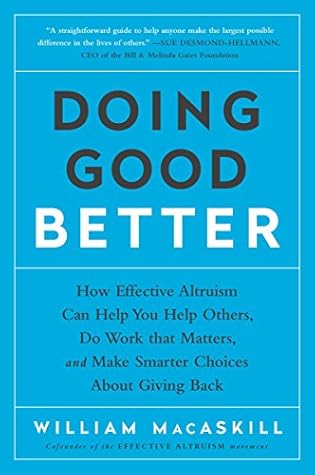More on this book
Community
Kindle Notes & Highlights
Read between
December 20 - December 27, 2018
People often want job satisfaction as an end in itself, but it’s also a crucial factor when thinking about impact: if you’re not happy at work, you’ll be less productive and more likely to burn out, resulting in less impact in the long-term.
For the large majority of people who don’t have work-related passions, the advice to “follow your passion” might merely prompt anxious soul-searching and send them into the wrong careers.
start by looking for work with certain important features. If you find that, passion will follow.
The evidence therefore suggests that following your passion is a poor way to determine whether a given career path will make you happy. Rather, passion grows out of work that has the right features.
What about following your heart, your gut, or your itch to find work you love? The evidence suggests that won’t work, either, since we’re bad at predicting what will make us happy.
First, to make a difference in the social sector, the organization you work for must be effective. If your charity job was at PlayPumps International, then, no matter how enthusiastically or efficiently you worked, you’d have made very little positive impact.
Second, you need to provide substantial value over the person who the charity would have hired instead.
three primary routes by which they can have impact on the job. The first is through the labor you provide. This can be the work you do if you are employed by an effective organization, or the research you do if you are a researcher. The second is the money you can give. The third is the influence you can have on other people.
For these reasons, especially when starting out, you should focus on building up skills, network, and credentials, rather than trying to have an impact right away.
Why hasn’t this problem been solved by markets? Why hasn’t this problem been solved by the state? Why hasn’t this problem already been solved by philanthropy?
An alternative route to having an impact without imposing a burden on charities is to work additional hours instead of volunteering and donate the money you make.
First, scale. What’s the magnitude of this problem? How much does it affect lives in the short run and long run?
Second, neglectedness. How many resources are already being dedicated to tackling this problem?
Third, tractability. How easy is it to make progress on this problem, and how easy is it to tell if you’re making progress?
The causes we hear the most about are precisely those where it will be harder to make a big difference; the causes that get less attention are those where we may be able to have a massive impact.
Incarceration also costs the government about $25,000 per person per year, whereas parole costs only about $2,000 per year, meaning the government could save billions annually.
place premium—the wage gain for foreign workers who move to the United States. For an average person in Haiti, relocation to the United States would increase income by about 680 percent; for a Nigerian, it would increase income by 1,000 percent.
Establish a habit of regular giving. Go onto the website of a highly effective charity and sign up to make a regular donation, even if it’s just ten dollars per month. This is the easiest and most tangible way of having a massive immediate positive impact.
Even a relatively small monthly donation to these charities will have a big impact.
For your birthday, instead of presents, you could ask for donations to a highly effective charity, creating a webpage on Causevox.com; Charity Science, a fund-raising website set up by two people in the effective altruism community, helps you to do this on their Take Action page.


